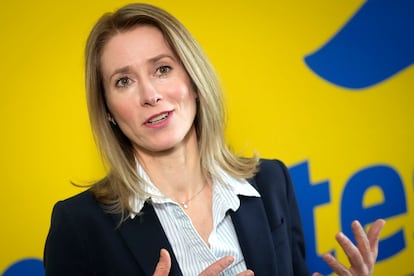Estonia’s pro-Ukraine prime minister Kallas wins reelection
The initial results mean the Reform Party is in a remarkably strong position to take a leading role in forming Estonia’s next government

The center-right Reform Party of Prime Minister Kaja Kallas, one of Europe’s most outspoken supporters of Ukraine, overwhelmingly won the Baltic country’s general election, while a far-right populist challenger lost seats in a vote that focused on national security and the economy.
Preliminary returns from a completed ballot count showed the Reform Party, the senior partner in the outgoing three-party coalition government, received 31.2% of the vote – the biggest share in Sunday’s election.
That translates into 37 seats at Estonia’s 101-seat Parliament, or Riigikogu, an increase of three seats from the 2019 election.
“This result, which is not final yet, will give us a strong mandate to put together a good government,” Kallas told her party colleagues and jubilant supporters at a hotel in the capital, Tallinn.
Kallas, prime minister since 2021, faced a challenge from the far-right populist EKRE party, which seeks to limit the Baltic nation’s exposure to Russia’s war in Ukraine, and blames the current government for Estonia’s high inflation rate.
EKRE took second place with 16.1% of votes and 17 seats in the legislature, a decrease of two seats compared to four years ago. The Center Party, which is traditionally favored by Estonia’s sizable ethnic Russian minority, was third with 15.3% of the vote.
The biggest surprise of the election, where more than 900,000 people were eligible to vote, was the emergence of Eesti 200, a small liberal centrist party, which won 14 seats and 13.3% of the vote.
“I think that with such a strong mandate, the (aid to Ukraine) will not change because other parties, except EKRE and maybe Center, have chosen the same line,” Kallas said.
She was referring to the substantial help that Estonia, a small nation of 1.3 million, has provided to Ukraine in the past year. Apart from weapons, Estonia is providing Kyiv with substantial humanitarian assistance and has welcomed more than 60,000 Ukrainian refugees.
The nationalist EKRE, which runs largely on an anti-EU and anti-immigration platform, has called for a cap on the number of refugees from Ukraine, saying Estonia can’t cope with so many people.
Its leader Martin Helme has also accused Kallas of undermining Estonia’s own defenses by donating arms to Ukraine.
Kallas argues it’s in her country’s interests to help Kyiv.
Political observers noted after the election that EKRE’s attack on Reform Party’s Ukraine policies was likely the main reason for some voters turning away from the populist party.
The full-scale invasion of Ukraine sparked fears in Tallinn that a Russian victory could embolden Moscow to switch its attentions to other countries it controlled in Soviet times, including Baltic nations Estonia, Latvia and Lithuania – now all NATO members.
Estonia, that borders Russia, broke away from the Soviet Union in 1991 and has taken a clear Western course, joining NATO and the European Union.
The initial results mean the Reform Party is in a remarkably strong position to take a leading role in forming Estonia’s next government. But it will need junior partners to form a coalition with a comfortable majority to govern.
Kallas has ruled out being in a government with EKRE due to ideological and policy differences, and is likely to turn to former coalition partner the Center Party and outgoing coalition partners – the small conservative Fatherland party and the Social Democrats – for a pact.
Newcomer Eesti 200 is also likely to be included in government talks with Reform.
Kallas emerged as the most popular candidate in the election with 31,821 votes, a record in Estonia’s political history. Her father Siim Kallas, an honorary chairman of the Reform Party, was also elected to the Riigikogu. He served as an Estonian prime minister from 2002-2003.
Kaja Kallas is a 45-year-old lawyer and former lawmaker at the European Parliament. She took over in 2018 as the chair of the Reform Party, which was founded by her father in 1994.
National security in the wake of neighboring Russia’s invasion of Ukraine and socio-economic issues, particularly the rising cost of living, were the main campaign themes of the election.
Preliminary results suggested six parties passed the 5% threshold of support needed to be in parliament.
Voter turnout was 63.7%, a rate that is on par with the previous election, according to initial information.
Sign up for our weekly newsletter to get more English-language news coverage from EL PAÍS USA Edition
Tu suscripción se está usando en otro dispositivo
¿Quieres añadir otro usuario a tu suscripción?
Si continúas leyendo en este dispositivo, no se podrá leer en el otro.
FlechaTu suscripción se está usando en otro dispositivo y solo puedes acceder a EL PAÍS desde un dispositivo a la vez.
Si quieres compartir tu cuenta, cambia tu suscripción a la modalidad Premium, así podrás añadir otro usuario. Cada uno accederá con su propia cuenta de email, lo que os permitirá personalizar vuestra experiencia en EL PAÍS.
¿Tienes una suscripción de empresa? Accede aquí para contratar más cuentas.
En el caso de no saber quién está usando tu cuenta, te recomendamos cambiar tu contraseña aquí.
Si decides continuar compartiendo tu cuenta, este mensaje se mostrará en tu dispositivo y en el de la otra persona que está usando tu cuenta de forma indefinida, afectando a tu experiencia de lectura. Puedes consultar aquí los términos y condiciones de la suscripción digital.








































